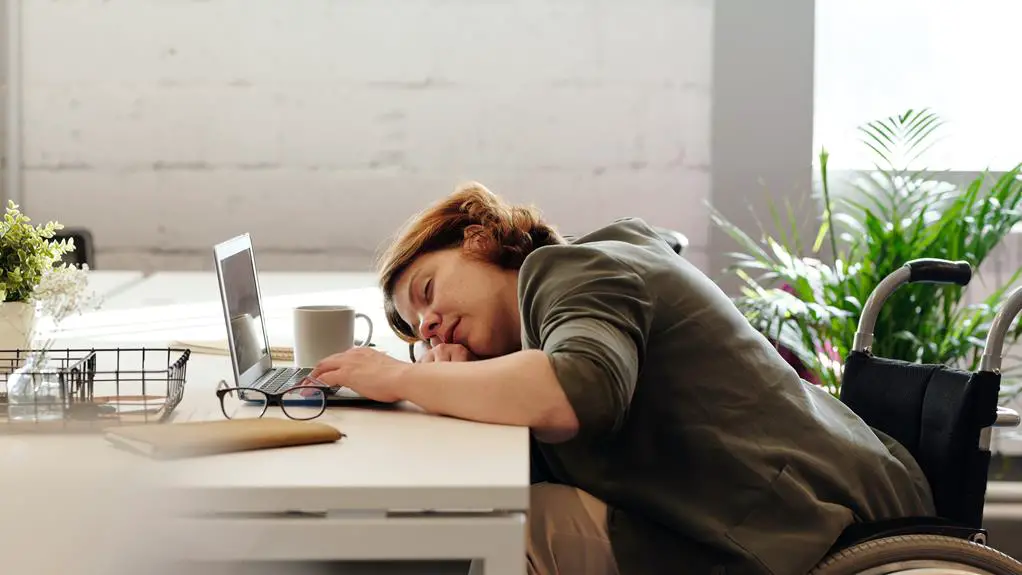Hey there, did you know that 75% of people who work from home experience sleep problems? It's a pretty staggering number, isn't it?
You might be nodding your head right now, thinking about how your own sleep has been affected since transitioning to a home office setup. But what exactly is causing this impact, and more importantly, what can you do about it?
Well, the answer might surprise you. Let's dive in and explore the ways your home office could be disrupting your sleep, and most importantly, how you can reclaim those precious Z's.
Key Takeaways
- 75% of people who work from home experience sleep problems
- Blurring the lines between professional and personal life can disrupt sleep patterns
- Poor sleep can lead to decreased work productivity and affect mental health
- Factors such as improperly arranged workspace, poor lighting, clutter, and noise can also affect sleep quality in the home office environment
The Relationship Between Home Office and Sleep
Working from home can have a significant impact on your sleep patterns. With the flexibility of remote work, it's easy to blur the lines between your professional and personal life. As a result, you may find yourself working late into the night or checking emails in bed, disrupting your sleep schedule. This can lead to decreased work productivity and affect your mental health.
When you bring your work into your living space, it can be challenging to establish boundaries. Your bedroom, which was once a haven for relaxation, may now be associated with work-related stress. This can make it difficult to unwind and fall asleep at night, ultimately affecting the quality and duration of your sleep. Consequently, you may find yourself feeling fatigued and less productive during the day.
Furthermore, the constant accessibility to work-related tasks can take a toll on your mental health. The pressure to always be available and responsive can lead to increased stress and anxiety, making it harder to achieve a restful night's sleep. This cycle of poor sleep, decreased work productivity, and compromised mental health can become detrimental to your overall well-being.
To address these challenges, it's crucial to establish a designated workspace and set clear boundaries between work and personal time. By creating a conducive work environment and prioritizing work-life balance, you can improve your sleep patterns, enhance work productivity, and safeguard your mental health.
Factors Affecting Sleep in the Home Office
Bringing work into your living space can impact your sleep in various ways, including factors that affect your ability to rest and unwind in the home office setting. One of the key factors affecting sleep in the home office is your workstation setup. If your desk and chair are not ergonomically designed, it can lead to discomfort and physical strain, making it harder for you to relax and fall asleep at the end of the day.
Consider the following factors that can impact your sleep in the home office:
| Factors | Description |
|---|---|
| Workstation Setup | An improperly arranged workspace can lead to discomfort and physical strain, affecting your ability to relax and sleep. |
| Ergonomic Furniture | Using ergonomic furniture can help support proper posture and reduce physical discomfort, contributing to better sleep quality. |
| Lighting | Poor lighting can cause eye strain and affect your circadian rhythm, impacting your ability to wind down and sleep. |
Tips for Improving Sleep in Your Home Office
If you want to improve your sleep in your home office, consider implementing simple adjustments to create a more comfortable and sleep-friendly workspace. Here are four tips to help you improve your sleep hygiene and create an ergonomic setup for your home office:
- Establish a Consistent Routine: Set a specific time to start and end your workday. Consistency signals to your body when it's time to wind down and prepares you for a restful night's sleep.
- Optimize Your Workspace: Ensure your desk and chair are at the right height to promote good posture and reduce strain on your body. Position your computer screen at eye level to prevent neck strain and use a supportive chair to minimize discomfort.
- Minimize Distractions: Keep your workspace organized and free of clutter to reduce visual distractions. Consider using noise-canceling headphones or a white noise machine to block out any disruptive sounds.
- Create a Relaxing Environment: Introduce calming elements such as plants, soft lighting, or soothing scents to help create a tranquil atmosphere in your home office. These elements can contribute to a more peaceful and relaxing work environment, making it easier to unwind and fall asleep at the end of the day.
Creating an Ideal Home Office Environment for Better Sleep
To ensure a better sleep environment in your home office, it's important to make simple adjustments that promote comfort and relaxation, such as establishing a consistent routine and optimizing your workspace for improved posture and reduced strain. One crucial aspect is creating an ergonomic setup that supports your body while working, as this can significantly impact your comfort and well-being. Additionally, incorporating natural light into your workspace can have a positive effect on regulating your circadian rhythm and improving your overall sleep quality.
Here's a simple guide to help you set up an ideal home office environment for better sleep:
| Ergonomic Setup | Description |
|---|---|
| Chair | Choose a chair with good lumbar support and adjust the height so that your feet are flat on the floor and your knees are level with your hips. |
| Desk | Position your desk at a comfortable height to prevent hunching over or straining your neck and shoulders. |
| Monitor | Place your monitor at eye level to reduce strain on your neck and eyes. |
| Keyboard and Mouse | Keep your keyboard and mouse at the same level to minimize reaching and straining. |
| Lighting | Maximize natural light by positioning your desk near a window to help regulate your body's internal clock. |
Recognizing Signs of Sleep Disruption in the Home Office
Recognize the signs of sleep disruption in your home office by paying attention to your energy levels and overall feelings of restfulness throughout the day. When remote work blurs the line between professional and personal space, it can lead to sleep disruptions that affect your productivity and well-being. Keep an eye out for these signs that indicate your sleep may be suffering:
- Persistent Fatigue: Feeling consistently tired, even after a full night's sleep, could be a sign of sleep disruption. If you find yourself struggling to stay awake or alert during the day, it may be time to evaluate your sleep patterns.
- Difficulty Concentrating: Trouble focusing on tasks, making decisions, or retaining information could be a result of poor sleep quality. If you're finding it hard to concentrate on your work, it may be worth considering whether your home office environment is conducive to restful sleep.
- Mood Swings and Irritability: Sleep disruptions can impact your mood, leading to irritability, increased stress, and heightened emotional responses. If you notice significant changes in your mood or behavior, it's essential to consider how your home office setup might be contributing to these shifts.
- Physical Symptoms: Headaches, muscle tension, and general discomfort can be physical manifestations of inadequate sleep. Pay attention to any physical symptoms you may be experiencing, as they could be indicative of sleep disruptions caused by your home office environment.
Establishing Boundaries Between Work and Rest at Home
Establishing clear boundaries between your work and rest at home is essential for maintaining a healthy balance and ensuring restful sleep. With the increasing prevalence of remote work, it's easy for the lines between professional responsibilities and personal time to become blurred. However, creating a clear distinction between your work and rest periods is crucial for your overall well-being, including sleep quality.
One way to establish boundaries is by defining specific work hours and sticking to them as much as possible. Setting a consistent schedule can help you maintain a healthy work-life balance, making it easier to unwind and relax when the workday is over.
Additionally, designate a specific workspace in your home where work is conducted, and try to avoid bringing work into other areas, especially your bedroom. This separation can help signal to your brain that it's time to shift from work mode to relaxation mode.
Furthermore, consider implementing a wind-down routine to signify the end of the workday and the beginning of your personal time. This could involve activities such as going for a walk, practicing meditation, or simply disconnecting from electronic devices. By doing so, you can transition more smoothly from work to rest, which can have a positive impact on your sleep quality.
Seeking Professional Help for Home Office-Related Sleep Issues
If you're struggling with sleep issues related to working from home, it might be time to consider seeking professional help.
Sleep therapy options and remote sleep specialists can provide tailored solutions to address your specific home office-related sleep concerns.
Don't hesitate to explore these resources and find the support you need to improve your sleep quality.
Sleep Therapy Options
Not sure where to turn for help with your home office-related sleep issues? Professional sleep therapy options can provide tailored solutions to improve your rest and well-being.
Here are some sleep therapy options and management techniques to consider:
- Cognitive Behavioral Therapy for Insomnia (CBT-I): This structured program helps identify and change thoughts and behaviors that affect sleep.
- Light Therapy: This involves exposure to specific wavelengths of light to regulate your circadian rhythm and improve sleep patterns.
- Relaxation Techniques: Practices such as meditation, deep breathing, and progressive muscle relaxation can promote better sleep.
- Sleep Medications: In some cases, a healthcare provider may prescribe medications to help manage sleep issues.
Exploring these sleep therapy options with a healthcare professional can lead to personalized strategies for improving your sleep quality.
Remote Sleep Specialists
Consider connecting with remote sleep specialists to receive personalized guidance for addressing your home office-related sleep issues. Remote consultations allow you to seek professional help without leaving your home. Sleep specialists can conduct a thorough sleep analysis to understand your specific challenges and provide tailored strategies to improve your sleep quality.
Through video calls or online platforms, you can discuss your sleep patterns and receive expert recommendations to create a conducive sleep environment within your home office. These specialists can also help you establish a healthy sleep routine, manage stress, and address any underlying sleep disorders that may be exacerbated by your work-from-home situation.
Seeking support from remote sleep specialists can significantly enhance your ability to overcome sleep disturbances associated with your home office setup.
Frequently Asked Questions
How Does the Home Office Environment Impact Mental Health and Overall Well-Being?
Working from home impacts mental health and overall well-being. Lighting affects mood and productivity. Noise levels can be distracting. Creating a comfortable and quiet home office environment is essential for your mental and physical health.
What Are the Long-Term Effects of Poor Sleep in the Home Office on Productivity and Performance?
When you're struggling to focus and feel creatively drained, it's easy to overlook the impact of sleep deprivation. But in the home office, poor sleep can seriously hinder your creativity and productivity in the long run.
Are There Any Specific Ergonomic Recommendations for Setting up a Home Office to Promote Better Sleep?
To set up a home office that promotes better sleep, consider ergonomic furniture and lighting solutions. Position your desk and chair for good posture, and use adjustable lighting to reduce eye strain and support natural sleep rhythms.
Can Using Technology in the Home Office, Such as Computers and Smartphones, Affect Sleep Patterns?
Using technology in your home office, such as computers and smartphones, can impact your sleep patterns due to blue light exposure. Implementing digital detox, sleep hygiene practices, and setting screen time limits can help mitigate these effects.
What Are the Potential Risks of Not Establishing Clear Boundaries Between Work and Rest in the Home Office?
Balancing work and rest in your home office is like walking a tightrope. Setting clear boundaries is crucial for work-life balance and sleep hygiene. Failing to do so can lead to burnout and disrupted sleep patterns.




